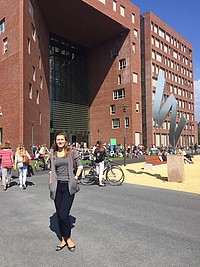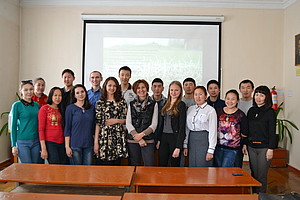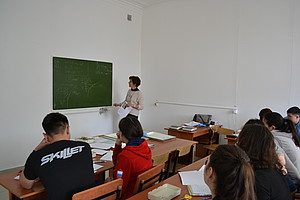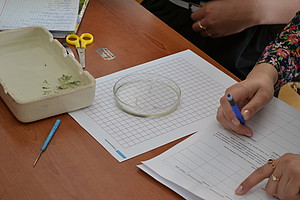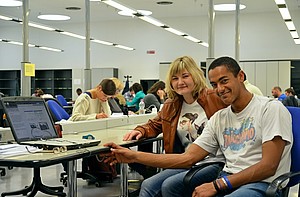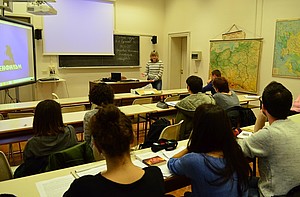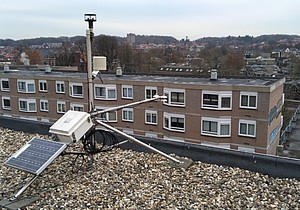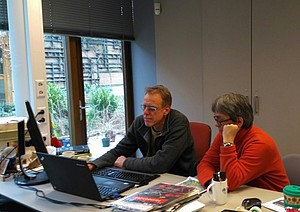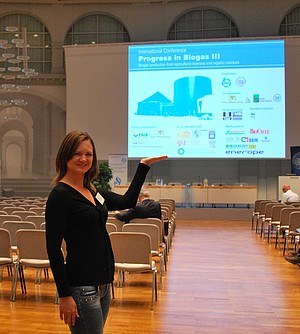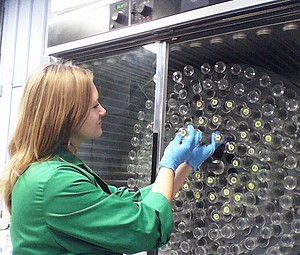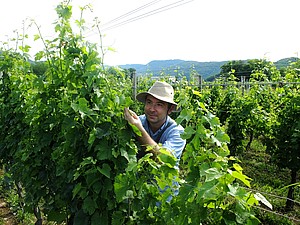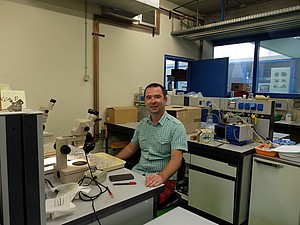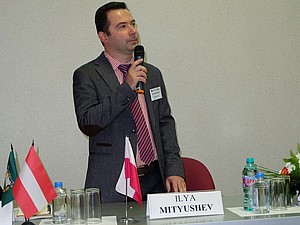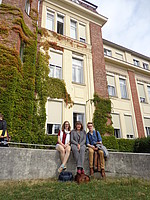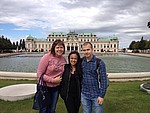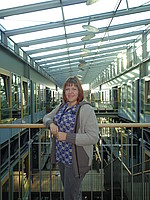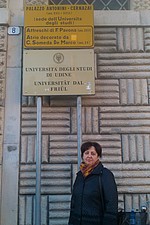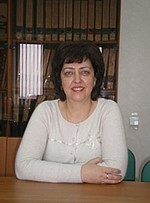Academic Staff
Academic Staff, 3 months - WS 2016-2017 at Wageningen University
Measure of sustainable development of regional agriculture using composite indicator in Stavropol Territory, Russia. This is the name of my research. The aim of this study is to develop a practical methodology for evaluating the sustainability of agriculture by means of composite indicator and to apply it to regional agricultural system. Within this framework to use the concept of sustainability as an element to support the government authority of agricultural sector.
We have already explored the theoretical basis for sustainable development of agriculture, have determined and assessed the main directions and current state of regional agriculture from the point of view of sustainable development. As such we developed a methodological framework for the evaluation guidelines and aspects of sustainable development of regional agriculture. It is a thematic comprehensive framework of Agricultural Sustainability with three dimensions (Economical, Social and Environmental). A theoretical model for Agricultural Sustainability with its themes and indicators under each of them was obtained. The next stage was data collection from sources. We selected all variables to be used in creation of Composite Agricultural Sustainability Index (CASI), normalized them, assigning weights to each variable (PCA). The final stage is going to be aggregation of these normalized values to create the multidimensional CASI, then presentation and analysis of results. We plan to publish the results of our research in the form of a scientific article in journals as Ecological Economics or Sustainable Agriculture.
By this mobility, I have improved my professional skills as a researcher and I have got necessary information for my research. As such I expended my knowledge in the field of economics and econometric models. We are going to continue our cooperation with Wageningen University, Department of Social Sciences, Agricultural Economics and Rural Policy for further studies in the field of agricultural sustainable development.
I participated in seminars, which were organized by the section Economics of Wageningen University. The seminars were aiming to foster the exchange on resent topics in the field of economics. I visited all of them since September once every week. Also I was invited to the defense thesis one of my colleagues (Julius Manda) and pre-defense (Quianqian Shao). It was extremely useful for me to know how my colleagues work here, what approaches do they use. I suppose I will bring some new ideas to my home university (Stavropol State Agrarian University).
One of my colleagues from China, Jinghui Hao, invited me to the Chinese autumn festival, which was organized by university association. It was so fascinating to know the traditions of other culture and try original cuisines. Also I was in Molenmarkt with traditional Dutch cuisines and music, which was organized by Wageningen citizens.
Academic Staff, 1 month - SS 2016 at Buryat State Academy of Agriculture
The objective of this activity was to advance our understanding of the climate induced changes on ecosystems in the region of Baikal Lake. In particular, a special focus was given to study on plant root growth comprising theoretical scientific aspects as well as planning and conducting of proper root investigations. According to the work schedule, special lectures in Russian language were given to the target groups at the Faculty of agriculture. The key topics addressed were: introduction to the main traditional and advanced methods of sampling and analysing of root systems under field and laboratory conditions; root (morphological and architectural) analyses using image analyses systems, characteristic root parameters - deriving, completing and interpretation of the data; importance for the ecology; area of applications of plant root studies - scientific and practical examples, case studies.
Due to the early growing season for local vegetation (April), and the partly frozen soil profile, deep root sampling in the field was reasonably avoided. Instead of this, shallow soil-root samples of the typical annual herb Erect Corydalis (Hypecoum erectum L.) were collected from the surrounded sandy steppes and analysed under laboratory conditions. In the frame of practical exercises with two student groups, the samples were handled to derive the following root morphological parameters: length, mass and density. For this, special teaching and practical materials were prepared and translated in the Russian language. Finally, the obtained results were discussed and interpreted. In this way, the students were given an opportunity to practice simple root analyses und to become skilled in handling of plant root samples. The lectures and practical exercises were organized in a close cooperation with the teaching staff, in particular with Mr. M. Kazakov, assistant at the Faculty of the Agriculture. Thus, the acquired knowledge was passed on to younger colleagues and can be further integrated in the study programs.
In addition, there were numerous meetings, discussions, scientific exchanges, conferences and cultural events I was actively involved in: scientific conference "all-Russian competition for the best student scientific work at the Chair of soil science and agro-chemistry", and following up personal discussions with the students on their scientific work; republic seminar on current problems of the landscape design in Ulan Ude with representatives of executive authorities, municipalities, science and business; joint work with the Dept. of Information Systems on e-learning and Mrs. Mangataeva.
There were also many meetings and personal exchange, e.g. with the Vice Rector for Academic Affairs Dr. Nikolaeva, with representatives of different offices and faculties, and especially with students addressing different issues of the higher education in Europe and at the BOKU University, student art activities, etc. During the whole activity, I was always and kindly supported by the members of the Faculty of Agriculture and the Academy, in particular by the Local coordinator Dr. Yampilova, and the local supervisor Dr. Imeskenova, Chair of Landscape design and ecology. This activity has for sure contributed to strengthening the co-operation between both academic institutions and will serve as a basis for future join research and educational activities.
Academic Staff, 3 months - WS 2016-2017 at the University of Udine
During the period of my internship I attended lectures and practical lessons of the Russian language and Russian literature, studied the methodological base and used materials available at the Faculty of Foreign Languages, got acquainted with new methods of teaching, studied new modern ways of it, mastered the methodology of video lesson conduction, studied the problems of language barrier and difficulties of adaptation of language norms. At the same time I planed, developed and conducted cycle of lessons (eight hours) with the use of video materials devoted to the Russian culture and traditions, organized and participated in extracurricular activities during which I introduced Russian culture and traditions to Europeans.
I attended the following conferences: International Round Table "Teacher and pupil abroad", the inauguration of the association "Russian light"", International workshop "Freedom of expression in the Russian Federation", Conference-concert "Ludwig van Beethoven (1770-1827)". During the period of my internship I also participated in international scientific conferences: "Methodical search: problems and solutions", "Modern trends of education in a multicultural society" and "Dulatovskie Chteniya".
It is important to note that I conducted scientific research on the problem of defining the level of students' motivational readiness in regard to independent cognitive activity while studying the Russian language in conditions of extra-linguistic environment. In conclusion I should write that the Erasmus Mundus Program helped me to advance my professionalism, improve my teaching skills, make new contacts with European teachers and exchange experience with them. I could partake in communication and collaboration with people from different countries in different languages (German, English). I integrated myself into another culture, life style and country. I cannot define any negative aspects of my stay. I am going to apply for further exchange projects to enhance my professional and personal development.
Academic Staff, 3 months - WS 2016-2017 at the Wageningen University
The aim of the research: Preparation of environmental and carbon balance dataset to understand the peculiarities of greenhouse gases fluxes in permafrost forest ecosystems under global climate changes. As a result of the work the long-term (years 2000-2014) quality-checked and gap-filled dataset of CO2 ecosystem exchange and coincident meteorological parameters were prepared and analyzed. The basic scheme of future articles was prepared. I also received new knowledges on programming in R language. The results of research done during the mobility will be used in my future Dr.Sci. thesis in Russia.
Integration and cooperation at the research group: Since 2001 I have a very good relations and a cooperation research with scientists in Wageningen University (particularly Alterra). During my stay, we continued our work, every two weeks having the seminars and brainstorms, discussing the results and finding new ideas and ways to solve problems and questions which appeared.
I can note the following main advantages of scientific work in Wageningen University: 1) Well organized working environment including cozy meeting spaces and presentation rooms, fully furnished with convenient equipment, very friendly and helpful office staff, and even such things as free coffee machines; 2) Superior free-of-charge access to electronic resources such as full texts of articles in various scientific journals and syllabus and educational courses in WUR libraries.
Presentations: I did some educational activity as follows: 1) Read the lecture "Climate changes in Yakutia: Long-term monitoring of biogeochemical cycles and microclimate of permafrost ecosystems by SakhaFluxNet observational network" for students of the course “Biogeochemical Cycles and Climate Change Mitigation”; 2) Conducted a practical seminar “Study of soil respiration using chamber method with PP Systems EGM-4 field gas analyzer” for students of the course “MAQ-23306 System Earth: Scale Dependence, Feedbacks and Global Change”, both in Wageningen University, the Netherlands.
Excursion: Field trip to “Loobos” station of Alterra, Wageningen University and Research Center.
Personal Aspects: I cannot notice any negative aspects of the stay, all was very good, including accommodation. Probably the only inconvenient thing was high public transportation prices in the Netherlands and some minor problems which were successfully solved with kind help of the IAMONET WU coordinator Ewa Wietsma and Marthy Boudewijn.
During my stay in Wageningen University, valuable and friendly support was received from Julia Fitzthum (Office of International Affairs, University of Hohenheim), Ewa Wietsma (IAMONET WU coordinator), Marthy Boudewijn (WUR) and Petra Cornelissen (Expat Center Food Valley). They helped me very much with the application procedures and many accommodation things.
I would like to have an opportunity to apply again if such possibility would be available.
And finally, in my opinion, three months are not enough to do the serious scientific job, I would prefer six months.
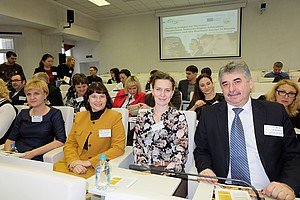
Academic Staff, 3 months - WS 2015 and WS 2016 at Warsaw University of Life Sciences WULS – SGGW
Scientific performance: One of the international projects of our university is the international course "MBA-Agribusiness". I am involved in it as a manager of the program as well as coordinator and teacher of the module "Human Resource Management (HRM)". I knew about successful experience of WULS in the organization of the MBA course and met Prof. Edward Majewskij at the Conferences and Board meetings of the AGRIMBA-network. I decided to apply for the IAMONET-RU project to study the experience of WULS in organization of the MBA course, to get an experience of HRM-teaching and to obtain information for the handbook in HRM. Because of my university duties it is difficult to be out of the office 1 month and it was very important for me that it was allowed to divide my mobility in 2 parts (2 weeks in 2015 and 2 weeks in 2016). Both stays in WULS were very fruitful:
Summary of the activities during the 1st and 2nd weeks would include: meetings with WULS professors and visiting lectures, discussing teaching materials and teaching methods, obtaining and study information for the handbook in HRM, selection of the content for the handbook in HRM, writing an article in HRM (published in Armenia (Scientific conference in Armenian National Agrarian University in 2016)), presentation about the development of agribusiness in Belgorod Region.
Summary of the activities during the 3rd and 4th weeks would include: participation in the conference "20 years of the MBA Program in Agribusiness Management at the Warsaw University of Life Sciences", participation in the AGRIMBA Board Meeting 2016, meetings with professors from universities of AGRIMBA-network (The Netherland, United Kingdom, Poland, Hungary, Croatia), discussing MBA strategy, teaching methods, teaching materials, obtaining case studies for the handbook in HRM, discussing opportunity for the publishing of the handbook in HRM, writing articles in Human Resource Management (sent for publishing in Tajikistan (Scientific conference carried out in Tajik National Agricultural University and Russian Scientific Journal "Omega science", writing an article in Quality Management of Vocational Education and Training (sent for publishing in APSTRACT), preparation of the presentation for the IAMONET conference "Building bridges for Success - Cooperation between Higher education Institutions and the Business Sector in Russia".
During both stays I had my working place with PC and all the office facilities and access to the MBA study materials on the website. Moreover, teaching staff of the faculty provided me their private books published most recent. Prof. Edward Majewskij arranged for me meetings to get acquainted with other faculties of WULS. As a result of new contacts Alexandra Gorecka from WULS taught Logistics in our MBA course in November 2015, the delegation of our university leaded by rector visited WULS in April 2016 and we would like to develop our cooperation. Personal Aspects: because of my administrative duties at the university there is always lack of time for personal development as a teacher and writing papers.
IAMONET mobility gave me an unique opportunity to dip into the academic environment and scientific atmosphere, which created opportunities for development of my professional skills (I taught HRM in English at the MBA course in Slovak University of Agriculture in Nitra in April 2016 using presentations and teaching materials prepared in cooperation with WULS colleagues during and after first part of my mobility in WULS) as well as inspiration for creating new ideas, writing papers and future scientific research. During my stay I have got only positive impressions of WULS, its staff and polish hospitality. For sure, I would apply again for IAMONET.
Academic Staff, 3 months - WS 2014-2015 at the University of Hohenheim
During my stay at the University of Hohenheim, the substrates of animal origin from Russia were examined with the help of Hohenheim biogas outcome test. The results were compared with corresponding indicators from Germany. Besides that, I took part in the research "Cellulose decomposition", which is a part of the project "Development of sensor technology and the learning of principles of load-resistant control systems of intermediate metabolic products in two-phase biogas installations, taking into account full substrate utilization ". The goal was the investigation of fiber degradation with the help of Shiitake fungi.
The host school provided the following: workplace and housing, scientific assistants, laboratory equipment, entrance tickets for events, counseling, technical literature and lectures. I could always turn to my tutor. Other employees of the institute also supported me in my work. During my stay, I attended the international conference "Progress in Biogas" (Stuttgart), the exhibitions "Euro Tier" and "Energy Decentral" (Hanover), as well as the ball under the harvest crown (Hohenheim).
The following differences in scientific work at my guest and home university are particularly noticeable to me:
1. In Hohenheim, since the first year of study, students have an opportunity to work scientifically and to earn money (student assistant).
2. Many doctoral students and master students participate in big scientific projects.
3. A lot of doctoral students and students, who are academically active, are from all over the world.
4. Good theoretical and practical science base.
Thanks to the IAMONET scholarship, I carried out the research for my doctoral thesis, established professional contacts with companies and received information about them, received proposals for the equipment of a biogas laboratory at my home university and improved my German skills. I was able to do my research in a modern laboratory, to work with experienced experts, to get advice from them, to gain practical experience in scientific and linguistic areas as well as to get to know the culture of Germany and other countries (not only during travels but also during communication with foreign students and doctoral students). Disadvantage: the stay was a bit short to prepare a scientific article. I would like to apply again for IAMONET or for a similar program.
Academic Staff, 3 months - SS 2016 at the University of Udine
In 2016 I passed my 3-month academic staff mobility at the University of Udine, Italy. One should notice that I already did my postdoc here in 2008, and therefore this mobility helped me to extend and support scientific contacts. During my 3-month stay in Italy I was involved in a few research projects carried out at the Department of agricultural, food, environmental and animal sciences of the University of Udine.
Particularly, I conducted researches (under laboratory conditions) on developing of phenological model of the European grapevine moth (Lobesia botrana), which is the key pest of grapevine both in Italy and Russia. We found that under variable temperature conditions its development occurs faster, than under constant temperature conditions. These results were presented at the International conference at my University in December 2016. A scientific paper on this subject is expected to be published.
Together with my Italian colleagues I worked in vineyards in the Friuli region so as to perform monitoring of some key pests of grapevine. This work allowed me to learn new methods of plant protection and to know more about modern equipment and research techniques. We also visited some sites with outbreaks of the brown marmorated stink bug (Halyomorpha halys), which is a new invasive pest both for the European Union and Russia. I made a first record of this pest in the Southern Russia in 2014, and therefore it was very important and interesting to know how is this pest being monitored and controlled in Italy.
During field excursions I took a number of photographs of pests and performed scouting techniques; they all are used in my teaching and research work. I also shared our experience of testing new foil-polyethylene pheromone dispensers that were developed by our research team in Russia in 2004-2015. Some dispensers and pheromone traps produced in Russia were taken to Italy and tested in the Friuli region for the first time in 2016. As an example of my didactic work, I passed some textbooks to my Italian colleagues. The remarks made by my colleagues were taken into account when I worked on the further editions of these books, and as an outcome of the mobility, the second edition of my "English-Russian terminological dictionary and handbook on plant protection" was released in 2017 (Saint-Petersburg: "Lan" Publishing house, 2017: 392 p.).
At the Department of agricultural, food, environmental and animal sciences I found a really warm and comfortable atmosphere that allowed me to work in good conditions. The most positive result of my mobility at the University of Udine is my experience of working in an international research team. It was interesting to meet researches of other nationalities (e.g. from Iran and Croatia). Apart from scientific benefits, I've grown culturally, since I had an opportunity to know more about Italian culture and traditions. I established not only professional contacts but also friendly relations with my Italian colleagues.
All in all, participation at the IAMONET-RU V project was a great experience for me at the professional and cultural levels and I would apply for this project again. Finally, I would like to thank all members of staff from the University of Udine, University of Hohenheim and the Russian State Agrarian University - Moscow Timiryazev Agricultural Academy, who had been involved in supporting and providing my individual mobility. Thank you very much indeed!
Academic Staff, 1 month - WS 2016-2017 at the University of Natural Resources and Life Sciences, Vienna
My name is Elena Zagorulko. I work at the International Department at Belgorod State Agricultural University, Russia. New knowledge, steady development and foreign languages are very important in my work. That's why every professional person should regularly refresh and renew his competences. I participated in the IAMONET-RU as Academic Staff in 2016 and had my mobility at the University of Natural Resources and Life Sciences, Vienna, Austria.
My mobility included two parts. On the one hand I observed the working life at the International Department and on the other I could visit a German language course.
There are many foreign students in BOKU and thus the International Department has a big well-organized team. Working processes are clearly planned and automated. Meetings and appointments with supervisors, applications for participation in programs, applications for admission, candidates' selection, courses registration / selection, feedbacks - everything is provided through the Internet with the help of special software.
Specialists give specific instructions to freshmen on how to use these recourses. The idea is that freshmen will be able to use them in their further independent work. Training mode and schedules are very flexible at BOKU. Students can independently choose seminars, lectures and exams dates via e-registration. It is great and very convenient! The team of the International Department does their best for their local students as well as for the foreign ones.
As for the second part of my mobility - it was very useful and beneficial to visit the German language course. I could refresh my already existing knowledge but also learn something new. I got ideas about Austrian special dialect and some language peculiarities. Classes were very intense but interesting and enthralling.
Students from different countries discussed modern topics and current problems of their countries in German and shared their knowledge. It was very interesting to meet different people and work together on various challenging tasks.
There were no Russian native speakers in my group and, I believe, it is a very important aspect that contributes to the successful educational process. Our teacher carefully planned every lesson, visually explained grammar material and helped students in their discussions.
I think my staff mobility was great and beneficial in every way. Definitely I would like to repeat this experience again. I have got new knowledge, skills and ideas, which will undoubtedly help in my professional life and further personal development.
Academic Staff, 1 month - WS 2014-2015 at the University of Udine
The field of my scientific work is methods in teaching languages. I passed two different stages of involvement in the teaching process at the University of Udine.
Firstly, I attended some lectures in Russian and English languages, including one about Russian literature. They were held by professors from the linguistic department. The usage of high technologies during the lectures made them more fascinating and dynamic.
I was given the chance to experience the language matter, develop ability to analyze it and comprehend the essence of the complex linguistic problems. I analyzed how the interest in a language and in research on it emerges, dived into the depths of language material.
The second stage included my own lessons in Russian language to undergraduates and young scientists. I prepared presentations and materials on the process of successful public speaking. During my lessons I aimed to present traditional topics as well as the current ones, such as research on cultural diversity, for example. In sum, I attempted to provide students with a broad understanding of the nature of public speaking and specific skills applicable for the Russian language.
Following the results of participation in this program a scientific article on the issues of teaching foreign languages was written and published in co-authorship with Professor Rosanna Giaquinta.
I didn't experience any negative aspects during my mobility, there were only positive ones. For me it was a deep integration in the teaching process and close cooperation with all colleagues of the linguistic department. I believe that the IAMONET-grant and experiences abroad didn't only contribute to my scientific career, but also gave me a great chance to continue my scientific and professional life with new ideas and achievements.

